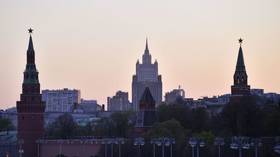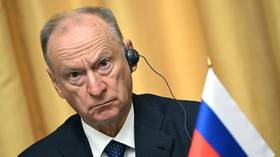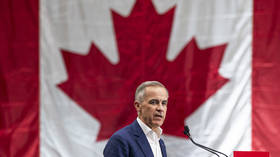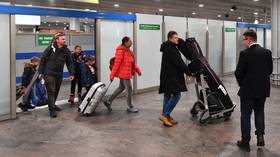Turkish army shells Kurds ‘refusing to retreat’ near Jarablus – state media
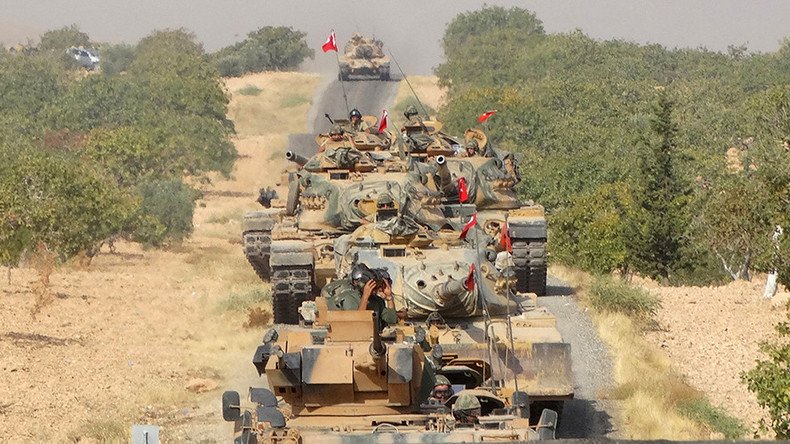
Turkish military have targeted US-backed Kurdish YPG militia with artillery fire south of the Syrian border town of Jarablus on Thursday, Anadolu state agency reported, citing a security source. The units allegedly refused to withdraw from the area despite warnings.
The group of YPG fighters were attacked with howitzers at about 6pm local time after they were spotted by Turkish intelligence advancing to Jarablus from the north of Manbij, the report said. Earlier, Washington assured Ankara that the US-backed Kurdish formations have been pulling out forces from the area to the east of the Euphrates River as demanded by Turkey.
READ MORE:Women burn burqas, men cut beards: Manbij celebrates liberation from ISIS (VIDEO, PHOTOS)
“Kerry [US State Secretary John Kerry] emphasized that the PYD/YPG forces have been withdrawing to the east of the Euphrates,” a Turkish security source was quoted by Hürriyet Daily News as saying following a telephone conversation between the US top diplomat and Turkey’s foreign minister Mevlut Cavusoglu on Thursday morning.
#BREAKING Turkish military hits YPG with artillery fire in north of Manbij as group advances ignoring warnings pic.twitter.com/uYi43LT1KB
— CNN Türk ENG (@CNNTURK_ENG) 25 августа 2016 г.
While on a visit to Ankara on August 24, US Vice President Joe Biden pledged to withdraw the support of American forces to Kurdish fighters battling terrorists in Syria if they did not comply with Turkey’s request to remain east of the river.
READ MORE:Turkey shells ISIS & Kurdish positions in Syria
"They cannot, will not and under no circumstances get American support if they do not keep that commitment. Period," Biden said at a joint news conference with Turkish PM Binali Yildirim.
Turkey has been conducting Operation Euphrates Shield since Wednesday after its troops entered the borderline territory in the north of Syria with the focus on retaking Jarablus from the Islamic State (IS, ISIS/ISIL) terrorists, which has been occupying it since July 2013. Justifying the incursion, which had not been authorized by the Syrian government, Turkey’s President Recep Tayyip Erdogan said it is aimed at stopping frequent cross-border attacks and repelling “terror groups which constantly threaten our country like Daesh [Arabic derogatory name for IS] and the PYD [the Democratic Union Party of Syria]”.
READ MORE:‘Blatant violation of sovereignty’: Damascus condemns Turkish operation in Jarablus
Meanwhile, Damascus slammed the offensive as “a blatant violation of sovereignty.”
The shelling follows a statement by YPG command saying that Kurdish militia under its control had left Manbij and returned to its bases, turning over the control over the city to the Manbij Military Council, according to Al-Masdar News.
On Wednesday, the YPG denounced the Turkish military offensive in Syria as “a hostile intervention,” refusing to cave in to pressure coming from Turkey.
“We won’t listen to the demands of Turkey or powers outside of Turkey. Turkey cannot impose its own agenda, its own interests on us. Our forces are there. We will not withdraw from west of the Euphrates,” YPG spokesman Redur Xelil said, as cited by Rudaw.
“Its main goal, more than ISIS, is the Kurds,” he pointed out.
At the moment, at least 20 Turkish tanks are taking part in operation inside Syria with more armored vehicles are expected to join the effort in the coming days as the Syrian rebels supported by Turkish forces are “cleansing” the city from jihadists.
The former IS stronghold of Manbij was freed by Kurdish-led SDF from jihadists just two weeks ago after months of intense fighting.
The Kurdish People’s Protection Units (YPG) are the armed wing of the Kurdish Democratic Union Party (PYD), close to the Kurdistan Workers’ Party, which Ankara considers a terrorist organization.
Turkey has been leading a military campaign against PKK insurgency in the country’s south-eastern Kurdish-populated regions, which has been criticized by rights groups for its brutality. Numerous reports have also suggested that Ankara bombed Kurdish targets inside Syria while allegedly sparing Islamist militants that the YPG have been in bitter battle with.
With US forces providing air support for Turkey’s offensive, there are growing concerns that the US is abandoning its biggest ally on the ground in Syria – the Kurdish-led SDF forces – which could hamper the war against the jihadists.
“We have been very clear on our support, they [Kurds] have been tremendous fighters against our common enemy, which is Daesh, and it’s a complex issue; it’s a fast-moving issue,” US State Department spokesperson Elizabeth Trudeau told RT’s Gayane Chichakyan, responding to a question about whether Washington was turning away from the Kurds by siding with Turkey in Syria.
Americans “do not have any other option at the moment” than to back Turkey’s incursion, even if it means severing ties with Kurds, Kamal Alam from the RUSI Defense strategy think tank told RT.
“They need Turkey more than the Kurds, because if Turkey goes rogue, on the other side, they are scared they’ll lose all the support as far as the counter-ISIL operation goes,” Alam added referring to the Incirlik Air Base, from which American aircrafts have been carrying out airstrikes against IS in Syria.
“It seems that they might have to ditch the Syrian Kurds in favor of Turkey and they want to continue the cooperation with Turkey,” the analyst said, noting that the “Kurds are redline for Turkey.”
Another reason Washington is supporting Turkey in Syria is out of fear of losing influence over Turkey, as Ankara “is looking into other options,” according to Alam.
“They [Turkish authorities] are speaking to Russia; they are speaking to Iran, and the most difficult thing for Americans is that now Turkey is taking a U-turn,” he said, referring to comments made by Turkish Prime Minister Binali Yildirim, who recently said that Syrian President Bashar Assad could be a part of a political transition in Syria.




